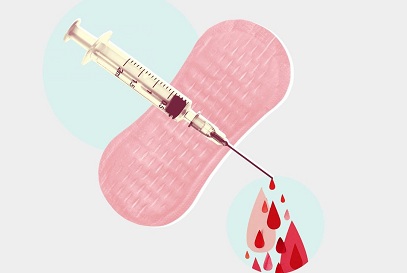UPDATED 17th October! Reproductive Specialist From Imperial College London Calls To Study Menstrual Changes As Result Of COVID-19 Vaccination Following More Than 30,000 Reported Cases!
Source: Women’s Health Sep 17, 2021 4 years, 4 months, 1 week, 4 days, 13 hours, 18 minutes ago
UPDATED 17th October 2021:After the publication of our article on September 17
th, numerous researchers responded and a team from Washington University in St. Louis, University of Illinois and Harvard University got together to conduct a detailed study which confirms that the COVID-19 vaccines does cause increased menstrual bleeding and also disrupts and causes irregular menstruation periods.
The study findings were published on a preprint server and are currently being peer reviewed.
https://www.medrxiv.org/content/10.1101/2021.10.11.21264863v1.full
According to their study abstract: Many women began sharing that they experienced unexpected menstrual bleeding after SARS-CoV-2 inoculation. This emerging phenomenon was undeniable yet understudied. The study team investigated menstrual bleeding patterns among currently and formerly menstruating people, with a research design based off expectations that these bleeding changes related to changes in clotting or inflammation, affecting normal menstrual repair.
The study findings showed that 42% of females with regular menstrual cycles bled more heavily than usual, while 44% reported no change, after being vaccinated.
Among females who typically do not menstruate, 71% of people on long-acting reversible contraceptives, 39% of individuals on gender-affirming hormones, and 66% of post-menopausal females reported breakthrough bleeding.
The study findings showed increased/breakthrough bleeding was significantly associated with age, other vaccine side effects (fever, fatigue), history of pregnancy or birth, and ethnicity. Changes to menstrual bleeding are not uncommon nor dangerous, yet attention to these experiences is necessary to build trust in medicine.
Women’s Health: A reproductive specialist from Imperial College London, Dr Victoria Male has called for an urgent acknowledgement and research into the occurrences of menstrual changes following COVID-19 vaccinations after it has emerged that there has been more than 30,000 such cases reported to the UK Medicines and Healthcare Products Regulatory Agency (MHRA).

The appeal was made via an editorial in the British Medical Journal.
https://www.bmj.com/content/374/bmj.n2211
Alarmingly it was found that the UK Medicines and Healthcare Products Regulatory Agency (MHRA) has been trying to downplay and conceal this adverse effects. It is also now coming to light that the US FDA and US CDC has also been concealing such reports as well.
Many women have been complaining that their periods change after getting a COVID-19 vaccination.
In an editorial published in the British Medical Journal (BMJ) in the last 24 hours, Dr Victoria Male, a reproductive specialist at Imperial College London, says a link between menstrual changes after COVID-19 vaccination is plausible and should be investigated.
Strangely changes to periods or unexpected vaginal bleeding are not listed as common side effects of COVID-19 vaccination, she writes.
Alarmingly however more tha
n 30,000 such reports had been made to the UK Medicines and Healthcare Products Regulatory Agency (MHRA) surveillance scheme for adverse drug reactions by 2 September 2021.
The reproductive specialist however said that most women find that their period returns to normal the following cycle and, importantly, there is no evidence that COVID-19 vaccination adversely affects fertility. (However detailed studies are also needed to reconfirm the fertility aspects in the long term)
The British regulatory agency, the MHRA has been trying to downplay and conceal the situation by stating that its surveillance data does not support a link between changes to menstrual periods and COVID-19 vaccines, since the number of reports is low in relation to both the number of people vaccinated and the prevalence of menstrual disorders generally.
Dr Male however argues that the way in which data is collected makes firm conclusions difficult.
She further argues that approaches better equipped to compare rates of menstrual changes in vaccinated versus unvaccinated populations are needed and points out that the US National Institutes of Health (NIH) has made US$1.67 million available to encourage this important research after much lobbying and protest by a group of reproductive specialists in America.
Alarmingly reports of menstrual changes after COVID-19 vaccination have been made for both mRNA and adenovirus-vectored vaccines, she adds, suggesting that, if there is a connection, it is likely to be a result of the immune response to vaccination, rather than to a specific vaccine component.
It is already a known fact that the menstrual cycle may be affected by the body's immune response to the virus itself, with one study showing menstrual disruption in around a quarter of women infected with SARS-CoV2.
Importantly if a link between vaccination and menstrual changes is confirmed, this will allow individuals seeking vaccination to plan in advance for potentially altered cycles, she explains.
However should the studies reveal something more concerning, then appropriate remedies need to be undertaken immediately.
Dr Male suggests that in the meantime clinicians should encourage their patients to report any changes to periods or unexpected vaginal bleeding after vaccination to the MHRA's scheme. And anyone reporting a change in periods persisting over a number of cycles, or new vaginal bleeding after menopause, should be managed according to the usual clinical guidelines for these conditions.
She urges that the MHRA should not ignore
Women’s Health issues arising from the COVID-19 vaccines.
She added, “One important lesson is that the effects of medical interventions on menstruation should not be an afterthought in future research."
It should also be noted that some stupid and unscrupulous American mainstream media, fact checkers and also social media platforms have been terming reports of menstrual issues as a result of COVID-19 vaccination as being fake news despite thousands of reported and documented cases!
For more on
Women’s Health Issues and COVID-19 Vaccination, keep on logging to Thailand Medical News.
